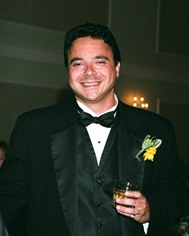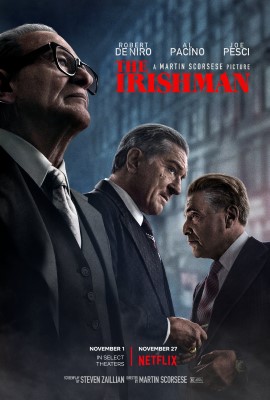Thanks to our fascination with mob stories, Martin Scorsese’s “The Irishman” is a film that actually gets better as it goes along. Based on Charles Brandt’s book “I Heard You Paint Houses” recounting the experiences of hitman Frank Sheeran (Robert DeNiro), the yarn yields a sizeable knot- Sheeran may know what happened when Hoffa disappeared in 1975. Was Sheeran involved? Finding out is the hook that grabs you.
Compared to Scorsese’s other modern mob movies, “Irishman’s” a somber addition to the trilogy. If “Goodfellas” marked a young man’s violent entrance and volatile exile from mafia life and “Casino” showed middle-aged men being chewed up and spit out in mob-controlled gambling mecca Las Vegas, “The Irishman” is a final fireside chat with a reflective Mafioso at the end of his years.
“The Irishman” begins with an aged and wheelchair-bound Sheeran (DeNiro) recalling his beginnings. After serving in WWII, Sheeran drives a truck to make ends meet for his family. Making deals to steal and profit on the merchandise he’s carrying helps Sheeran increase his income.
On one delivery, mechanical problems lead Sheeran to a gas station where a man helps him. While the two get along, the man won’t give Sheeran his name. When Sheeran’s eventually questioned for his payload purloining, he discovers his union lawyer Bill Bufalino (Ray Romano) is brothers with the man and the man’s name is Russell Bufalino (Joe Pesci). Though Sheeran’s ignorant of Russell’s work, seeing Russell with Philadelphia mob boss Angelo Bruno (Harvey Keitel) clues him in quick.
Russell is reserved but likes Sheeran. With Sheeran’s military background, Russell asks if he’s comfortable “painting houses” – mafia’s code for killing. Sheeran helps Russell ‘paint some houses’ and a grateful Russell puts him in touch with Jimmy Hoffa (Al Pacino). Hoffa could use a painter/truck driver like Sheeran and the two soon become teamster teammates.
Like any good mob movie, Sheeran’s stories move “The Irishman” into “Forrest Gump meets The Godfather” territory. We see Sheeran deliver a truckload of weapons to David Ferry (linked in Kennedy’s eventual assassination) and Howard Hunt (Watergate’s scandalous CIA officer) to help defeat Castro. That revenge shooting for Joe Colombo outside Umberto’s in 1971? Sheeran was there. After becoming close to Jimmy Hoffa, it’s only a matter of time before Sheeran tells you what happened.
Even at a daunting three and a half hour running time, the structure of Steven Zaillian’s script saves you. Zaillian (“American Gangster,” “Gangs of New York”) spares your suffering by telling the story in an interesting and linear three acts. With an hour for Sheeran’s beginnings and another of Sheeran working with Hoffa, the last 90 minutes contain the details of Hoffa’s vanishing act and Sheeran’s subsequent repercussions.
While Pacino’s look and speech as Hoffa are on point, it’s DeNiro and Pesci that stand out. “Raging Bull” notwithstanding, Scorsese’s “Goodfellas” and “Casino” cemented their onscreen pairing and seeing them together is a fitting finale should “The Irishman” be Scorsese’s syndicate swan song. While DeNiro pulls at your emotions toward the end as Sheeran’s reflections turn repentant, Pesci impresses by playing against type. Without his usual blustery role, Pesci’s quiet take on Bufalino makes him all the more imposing. Scenes where Pesci stares at those who rebuke or disregard him give him the aura of a calculating, tightly-wound cobra. With Netflix, pausing your way through “The Irishman’s” okay: it could have been a three-part miniseries. If you catch it in one sitting, it’s not as arduous as you’d expect. But do see it: in Scorsese parlance, it may be his cinematic wiseguys’ ‘Last Waltz.’

